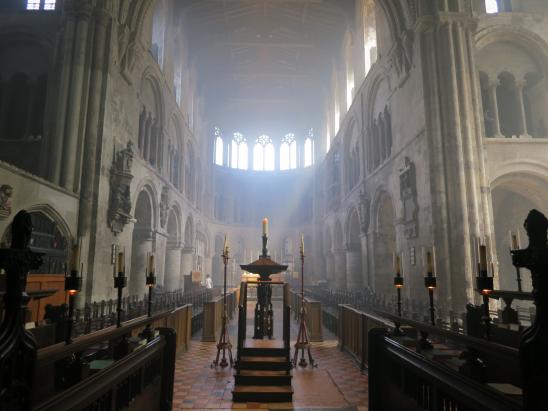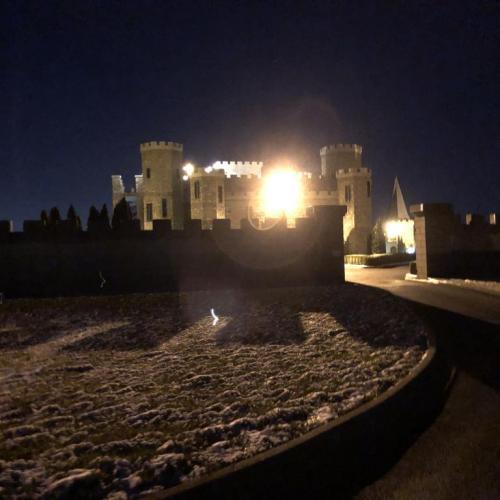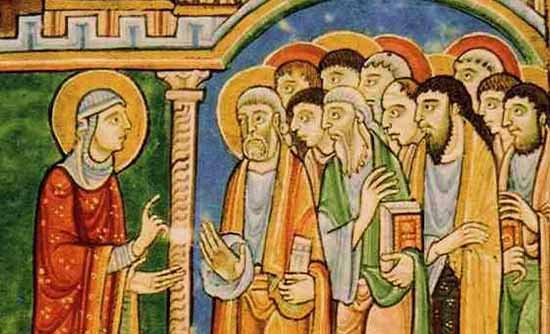Romans 8:31, Chris Tomlin, And The Faith Of A Medieval Woman

“Water You turned into wine; Opened the eyes of the blind; There’s no one like you; None like you; Into the darkness You shine; Out of the ashes we rise; There’s No one like you; None like you”
In 2010 Chris Tomlin recorded these opening lyrics to “Our God” at a Passion Conference. He couldn’t get the words of the song out of his head–especially the chorus “And if our God is for us, who could ever stop us?”–so he named his 7th album “And if Our God is For Us.” The Christian public couldn’t get the lyrics out of their head either, as the “Our God” was #1 on Billboard Christian charts for 10 weeks. In 2011 Chris Tomlin was named “Top Christian Artist” at the Billboard Music Awards while the song “Our God” won the “Top Christian Song”. In 2012 the album won Tomlin his first Grammy.
When I first heard the song, played by our youth worship band, I too couldn’t get the words out of my head. Like Chris Tomlin, it was the Romans 8:31 chorus that stuck with me.
“And if Our God is for us, then who could ever stop us? And if our God is with us, then what can stand against?”
Yet the reason the song stuck with me was rather different than why it stuck with Chris Tomlin or even the broader Christian public.
It stuck with me because it reminded me about the faith of a medieval woman–577 years before Tomlin recorded “Our God”.
In 1433, almost exactly a century before the English Reformation and almost a century after the onset of the Black Death in Europe (just to help you put it in historical context), a woman named Margery Kempe was traveling in the eastern part of England, near Walsingham. As The Book of Margery Kempe reads: “And, as she was on the way thither-ward, she heard tell that a friar would preach a sermon in a little village, a little out of her way. She turned into the church, where the friar said the sermon, a famous man, who had a great audience at this sermon.” What Margery Kempe heard in that sermon affected the course of her life. “And many times he said these words: ‘If God be with us, who shall be against us?’” The medieval preacher quoted the scripture passage behind Chris Tomlin’s 2010 hit song: Romans 8:31. Most scripture in medieval sermons was quoted directly from the Vulgate (in Latin) and paraphrased in English. But we do know that Middle English Bibles were available in the fifteenth-century, including the Wycliffe Bible which was used by ordinary Catholic preachers. Romans 8:31 as attributed by Margery Kempe to this medieval preacher is very close to the Wycliffe translation: “What then shall we say to these things? If God be for us, who is against us?”
I can almost hear the words of Chris Tomlin’s twenty-first-century song echoing in the stone nave of Margery Kempe’s fifteenth-century parish church.
“And if Our God is for us, then who could ever stop us? And if our God is with us, then what can stand against? And if Our God is for us, then who could ever stop us? And if our God is with us, then what can stand against? Then what can stand against?”
Margery Kempe was especially moved by the quoting of Romans 8:31 because God had already spoken this scripture passage to her. Shortly before she went to Walsingham, Kempe was sitting in church with her daughter-in-law when she “was commanded in her heart to go over the sea.” She argued with God, saying she did not have permission from her priest, that she was too old for a sea voyage, and that she didn’t have the money. “She would have put it out of her mind, but ever it came again strongly so that she could have no rest or quiet in her mind, but ever was laboured and commanded to go over the sea.” Finally, God spoke directly to her: “If I be with thee, who shall be against thee? I shall provide for thee, and get thee friends to help thee. Do as I bid.” The words of Romans 8:31, whispered to her by God, were then echoed almost exactly by the preacher near Walsingham.
“And if Our God is for us, then who could ever stop us? And if our God is with us, then what can stand against? And if Our God is for us, then who could ever stop us? And if our God is with us, then what can stand against? Then what can stand against?”
Margery Kempe was advanced in age. She was mostly alone. And she was defying the advice of her family and her local priest. As her book records, “Some said it was a woman’s whim, and a great folly. . .to put herself, a woman of great age, to the perils of the sea, and to go into a strange country where she had not been before, nor knew how she should come back.”
But Margery Kempe had faith. The words of the preacher confirmed what she already believed–God wanted her “to go over the sea.” So she did. Her faith took her from England to Germany; her faith carried her across the “perils of the sea” into a “strange country”; her faith carried her to pilgrim sites throughout Europe; and her faith brought her back home. As her book testifies about her faith, “She knew well, to God nothing was impossible.”
Romans 8 speaks about faith. The same faith–the very same scripture!–that spoke to an American evangelical worship artist in 2010 also spoke to a medieval Catholic woman in 1433.
As we approach the 500th anniversary of the Reformation, it is refreshing to see that some things haven’t changed.
Please see The Book of Margery Kempe 1436: A Modern Version by W. Butler-Bowdon (Alden Press, London: 1936), pp. 305-312, and p. 304. You can find my published article about Margery Kempe’s faith in the Journal of Religious History 39:1 (March 2015).





